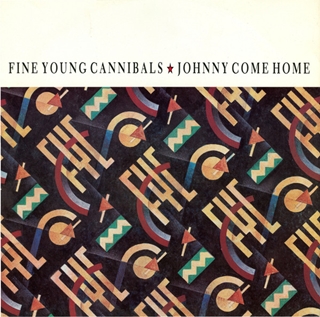Top Qs
Timeline
Chat
Perspective
Johnny Come Home
1985 single by Fine Young Cannibals From Wikipedia, the free encyclopedia
Remove ads
"Johnny Come Home" is a song by British band Fine Young Cannibals, released as the first single from their debut album, Fine Young Cannibals (1985). It is similar to the style of many other of the band's hits, a mixture of rock and ska with Roland Gift's distinctive vocals, as well as a jazz-type trumpet solo. It was released in May 1985 by London Records and was one of the group's most popular hits. The song tells the gritty realistic story of a runaway youth, and alternates from the first-person narrative, explaining how his arrival in the big city has not turned out as he expected, to the view of the parents in the chorus, expressing their wish that he would come home.
Remove ads
Chart performance
Although it failed to reach the top 40 in the United States, stalling at No. 76,[3] along with the track, "Blue", "Johnny Come Home" reached No. 9 on the Billboard dance chart.[4] The track was a good start for the group in their native United Kingdom, peaking at No. 8 on the UK Singles Chart in July 1985.[5]
Reception
David Bennun from Melody Maker wrote, "I can particularly recommend 'Johnny Come Home', FYC's first and best hit, which was far more revealing of their roots in the British ska scene than anything that followed; notably they had the nous to borrow not from their own former combo, The Beat, but from the much superior Specials. 'Johnny' was brisk, poignant and discreetly political, elevated by a desolate, roving trumpet and Roland Gift's plaintive, mannered vocal, and they never topped it."[6] John Leland called it, "dark, eerie dance music. 'Johnny' puts a little Suicide creepiness, some fake opera, muted trumpet, and spare, pumping piano into a groove that moves on its keyboard bass."[7] Spin called it, "an easy skittish ska-ish tune with an underlying urgency. Jazzy muted trumpet solo bops along with solid guitar. Plus Gift's instrument of a voice is gonna stick (splat!) like glue to your brain as you find yourself hummin' the refrain."[8]
Remove ads
Charts
Popular culture
- In later years the song's title would serve as the title for a Jake Arnott novel published in 2006 whose plot line is reminiscent of the themes discussed in the song.[18][better source needed]
References
Wikiwand - on
Seamless Wikipedia browsing. On steroids.
Remove ads

